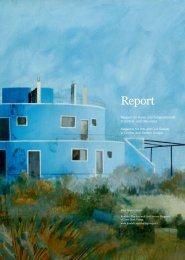Report_Issue 1/2009 - Jubiläum/ 20 Jahre Mauerfall
Report_Issue 1/2009 - Jubiläum/ 20 Jahre Mauerfall
Report_Issue 1/2009 - Jubiläum/ 20 Jahre Mauerfall
Erfolgreiche ePaper selbst erstellen
Machen Sie aus Ihren PDF Publikationen ein blätterbares Flipbook mit unserer einzigartigen Google optimierten e-Paper Software.
Manuela Hötzl: You say that with the fall of<br />
the Iron Curtain, a “Pandora’s box of political<br />
nightmares” was opened for Croatia. At the<br />
same time, a significant development in the<br />
direction of independence had already started<br />
under Tito. What is the situation in Croatia at<br />
present?<br />
Vedran Mimica: In the fifties, sixties and seventies<br />
Yugoslavia differed in a number of respects<br />
from other Eastern European countries behind<br />
the former Iron Curtain. This was primarily<br />
because Tito was not comparable with other<br />
political representatives of that time such as<br />
Brezhnev, Ceaus¸escu or Honecker. These politicians<br />
were completely dominated by the Soviet<br />
block, whereas Tito, as is well known, was<br />
not. However, preventing the democratisation<br />
of the economy cost him political legalisation in<br />
Europe and was what first introduced developments<br />
in this country that created the state in<br />
which it finds itself today. At the same time in<br />
its role as a buffer zone between East and West<br />
Yugoslavia was economically most successful,<br />
which Tito as a kind of political genius – that he<br />
most certainly was – also defined and exploited<br />
for his own ends.<br />
What significance did the integrationist and yet<br />
international policies of Tito have for the cultural<br />
scene in former Yugoslavia?<br />
The collapse of the country was fatal for the cultural<br />
scene in Yugoslavia. One should not forget<br />
that under Tito artistic freedom was a possibility.<br />
An avant-garde – like say under Stalin – did<br />
not “develop”, it was always there. At the time<br />
when in East Germany or in the Soviet Union<br />
Stalinist Realism was viewed as the most important<br />
movement, Joseph Beuys held a workshop<br />
in Belgrade. This is an indication of the<br />
great difference.<br />
Were cultural differences and identities – say,<br />
for example, the differences between Slovenia<br />
and Croatia not so important at that time?<br />
Naturally such differences always existed, Yugoslavia<br />
was never a homogeneous state. Slovenia<br />
and Kosovo cannot be compared with each<br />
other. Different histories, languages, economies<br />
and culture were always linked to each<br />
other in Yugoslavia. I compare former Yugoslavia<br />
with the EU today. The differences between<br />
Portugal and Ireland, for example, could hardly<br />
be greater. This doesn’t mean that this is a bad<br />
thing. Tito's idea was that the better-developed<br />
nations would help the less developed ones and<br />
that both could profit from each other. This is<br />
precisely the “argument” of the EU today. The<br />
great difference lies in the success of the EU<br />
and Yugoslavia’s lack of success.<br />
Vedran Mimica (born 1954), Croatian architect and director of the Dutch Berlage Institute, still maintains close ties with<br />
his native country. Although in 1979 he moved abroad, he is still actively committed to his country. In an interview he<br />
analyses the significance of Tito and the drama of Milošević for the cultural scene of present-day Croatia. However new<br />
processes are developing, and a committed scene made up of independent associations is taking the cultural development<br />
of the country in hand.<br />
— Manuela Hötzl talks to Vedran Mimica —<br />
Were the individual identities of the different<br />
nationalities previously supported?<br />
No, these identities were suppressed. Not entirely,<br />
but partly.<br />
In Croatia today is the Tito era ignored or idealised?<br />
Idealised? In Croatia not so much. It is more<br />
the case that my Croatian friends are almost all<br />
nationalists. Clearly there exists in this country<br />
a historically based tragedy that developed<br />
largely during the Second World War and that<br />
split the Croatians into fascist nationalists and<br />
federal communists. I personally am proud that<br />
my father was a “Tito-ist” but others are proud<br />
of the fact that their fathers were Croatian nationalists.<br />
This ideological separation still exists.<br />
It is not that we Croatians believe that the<br />
Second World War isn't over yet, but the theme<br />
is still present in public debates.<br />
Does this nationalism have a vision?<br />
I tend to answer no. What happened is – curious<br />
or not – that in the post-socialist landscape<br />
during the nineties, when the war was<br />
still very much present, a kind of structuralist<br />
discourse started up. Croatian intellectuals regarded<br />
themselves as left-wing, however they<br />
meant left-wing in the sense of the Frankfurt<br />
School or Sartre. These intellectuals and their<br />
ideas never prevailed at any time; instead they<br />
encouraged a curious national romantic vision<br />
of a new state. Boris Groys has also commented<br />
on this theme. The gist of what he says is: if one<br />
simply extinguishes one’s history (in the case<br />
of Croatia its socialist and communist history)<br />
then one is behaving like a Stalinist. It was the<br />
Stalinists who negated the Russian avant-garde<br />
in order to return to a new, pure starting point.<br />
And this is precisely what intellectuals in Croatia<br />
favoured at the beginning of the 1990s: the<br />
total effacement of the modern tradition and a<br />
return to a romanticism of the 19th century. But<br />
if one wishes to define Croatia as part of Europe<br />
one cannot encounter this new European community<br />
in such a way but only in a way that is<br />
multi-cultural, dynamic and modern.<br />
Milošević the great drama for Yugoslavia and<br />
Croatia …<br />
It was he who initiated the collapse of Yugoslavia<br />
and its disappearance. His politics were those<br />
of destruction. Slavoj Žižek would argue: look,<br />
it is not the Balkan chaos but rather the chaos<br />
of the Western powers that produces figures<br />
like Milošević. They did not support him perhaps,<br />
but created him in the first place. Western<br />
Europe was for a long time divided about how<br />
to deal with the crisis and about the question of<br />
Yugoslavia's future. When they reacted in <strong>20</strong>00<br />
it was clearly far too late. The process of disintegration<br />
was nearing its end point in Slovenia,<br />
Croatia and Bosnia. The intervention in Kosovo<br />
brought it to a conclusion, so to speak. In this<br />
sense Milošević was “created by the West”.<br />
How powerful are the institutions of the former<br />
system today?<br />
Ministries, universities, scientific and cultural<br />
institutions behave at times in an even more<br />
“socialist” way than before. If something does<br />
not happen quite soon, it will be extremely<br />
difficult to get new developments of any kind<br />
started. This is true of all countries, not just<br />
Croatia, but also the Czech Republic, Poland or<br />
Hungary.<br />
Does this also apply to museums?<br />
Yes, indeed it does. Parallel to this, however,<br />
one can observe a fantastic involvement of the<br />
“NGOs” in culture and architecture. They have<br />
initiated an interesting, “alternative scene”.<br />
Nevertheless in my opinion it isn't really as<br />
alternative as many people call it. It would be<br />
more correct to describe this unbelievably active<br />
cultural production as urban – and multidisciplinary.<br />
That is to say, it receives support<br />
from all possible sides.<br />
Do these independent associations also collaborate<br />
with state institutions or municipal administrations,<br />
for example in Zagreb? Do they<br />
communicate with each other?<br />
Naturally one should not badmouth everything.<br />
There is always somebody in the ministries<br />
who supports these independent groups and<br />
in fact is also expected that the EU will do this.<br />
But at times communication is difficult because<br />
of people's lack of knowledge, for example in<br />
questions of urban design or regarding strategic<br />
planning.<br />
Do these independent groups at present receive<br />
more support than the somewhat sluggish official<br />
institutions, both regionally and internationally?<br />
Without any doubt these active NGOs represent<br />
everything that is of interest in Croatia<br />
at the moment. But I think that this cannot be<br />
enough. These groups can never replace the<br />
activities required of a government, and most<br />
certainly not when the country is part of the<br />
EU. But they succumb to the belief that this<br />
is precisely what they can do. But I think that<br />
these young people are ultimately too smart to<br />
behave like Don Quixote and Sancho Panza.<br />
Croatia must change in this respect. Its institutions<br />
must be reformed; if this is not done it<br />
would be better to close them down now rather<br />
than to let things continue the way they are at<br />
present.<br />
What role does privatisation play?<br />
The transformation of one system into another,<br />
which is being spread through all the Eastern<br />
European countries by democracy and the<br />
free market, is certainly happening somewhat<br />
too fast and with too little control. But nobody<br />
came or comes up with a better solution. Žižek<br />
wanted to reflect about a “third way”, to find a<br />
middle way between communism and late capitalism<br />
but there was nobody who was in a position<br />
to implement this.<br />
What concept does Croatia have?<br />
At the moment the question is whether it is really<br />
wise to simply incorporate all aspects of<br />
European integration in our policies or whether<br />
it might be possible for us to find a concept better<br />
suited to Croatia – but that would be like a<br />
miracle. I don't see this happening.<br />
What is most lacking?<br />
There is no critical mass in Croatia that seriously<br />
examines the country’s development.<br />
There exists no possibility of breaking out of<br />
this system as it is at present. In this context<br />
I support these free “alternative” associations.<br />
Their activities are good for this country. This<br />
also has implications for Macedonia, Serbia<br />
and Albania. These groups have at least introduced<br />
the international discourse into this<br />
country – which is what we need at the present<br />
moment in time.<br />
Vedran Mimica (born 1954) is director of the Berlage<br />
Institute in Amsterdam (NL). He is educated as an architect,<br />
he was a lecturer at the Faculty of Architecture at<br />
the University of Zagreb and a postgraduate researcher<br />
at the Delft University of Technology. An active writer on<br />
architecture and architectural education, he led the curatorial<br />
team for the International Architecture Biennale<br />
Rotterdam <strong>20</strong>07.<br />
Published in “<strong>Report</strong>” in June <strong>20</strong>04 (online)<br />
43




